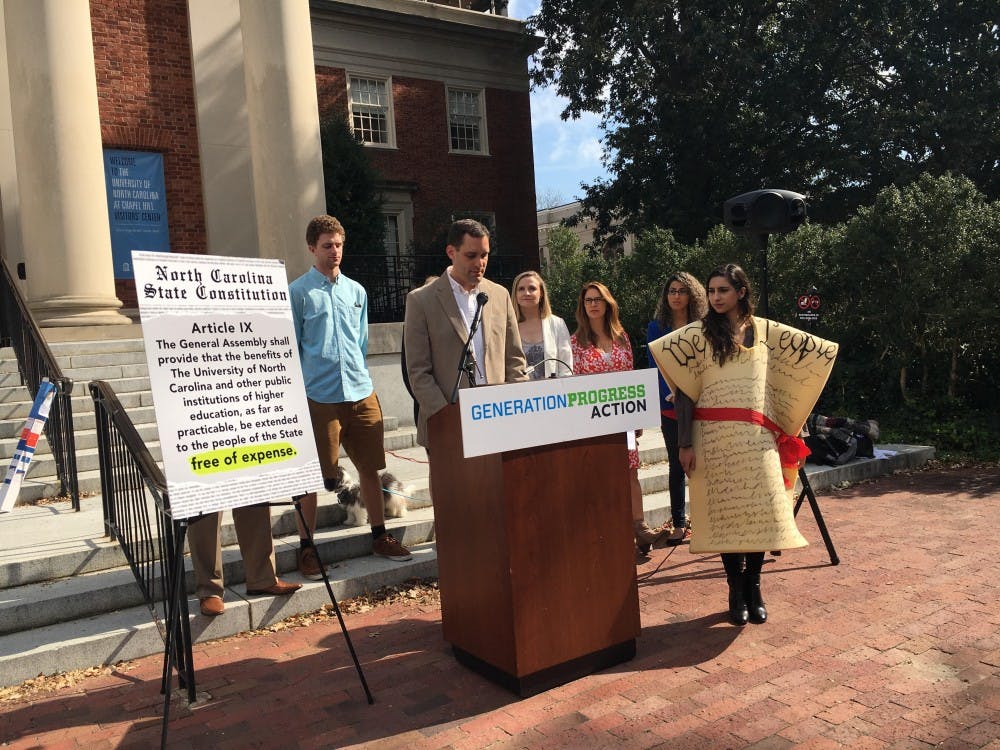N.C. Rep. Graig Meyer, D-District 50, who has represented Caswell and Orange Counties in the General Assembly since 2013, has expressed his concern over the cementing of what appear to be new legislative trends.
“Ever since the Republican takeover in 2010, they have cut corporate taxes in every budget that they’ve had control over,” he said. “And our investments in education are falling behind.”
The corporate income tax rate in North Carolina fell to 6 percent in 2014, falling by one percentage point each of the following years until 2017, when it fell to 3 percent. It was cut to 2.5 percent effective Jan. 1, 2019.
When it comes to education, there has been an overall increase in spending of $4.5 billion from 2010 to 2018. However, North Carolina ranked 39th in per-pupil spending in the United States, according to Public Schools First N.C., an education nonprofit organization.
In a recent speech at an event announcing the opening of the new headquarters of Well Dot Inc. in Chapel Hill, Gov. Roy Cooper expressed similar concerns over Republicans’ budget priorities when discussing the importance of investing in the state’s future workforce.
“We know that we need better teacher salaries rather than more sweeping corporate tax cuts,” he said.
Another major policy issue over the past decade has been Medicaid expansion, which has dominated debates on spending at the national and state level since the passing of the Affordable Care Act in 2010.
Several state legislators have cited the absence of a legitimate plan to expand Medicaid as a major reason why Cooper vetoed the state’s most recent budget proposal in June. As a result, the government has yet to enact an appropriations measure for the 2019 fiscal year.
N.C. Rep. Verla Insko, D-District 56, who has represented Chapel Hill in the General Assembly since 1997, said the state had a plan to enact an expansion in 2010, but the bill was never passed.
Creating the stalemate
A major change Insko has seen over the course of her tenure has been the way in which the General Assembly spends money. She said that while some government programs went over budget under Democrats, there has been a shift in the trend over the past 10 years.
“Now, almost all of the departments of state government are underfunded,” she said. “State employee salaries are low. We have more turnover than we used to.”
To get the day's news and headlines in your inbox each morning, sign up for our email newsletters.
Irrespective of issues, the way the General Assembly interacts with the governor during budget negotiations has also changed.
N.C. Rep. Donny Lambeth, R-District 75, who has served in the General Assembly since 2013 and is the senior appropriations chair in the N.C. House for this year’s negotiations, cited the importance of partisan control of each side of the process.
The governor has vetoed an appropriations proposal four times over the past ten years, each time by a Democratic governor. For the first three, Republicans had enough numbers in both chambers of the legislature to override the vetoes of Governors Perdue (2011) and Cooper (2017 and 2018).
However, this year poses an exception to the rule, as Republicans do not have the votes necessary to override Cooper’s veto.
“The difference is that the Republicans do not have the supermajority that can override a governor’s veto,” Lambeth said. “And that’s what’s creating the stalemate.”
He said Democratic legislators are sticking with the governor and are refusing to override his veto, despite being free to do so. As a result, only the House has been able to override the veto, with no progress being made in the Senate.
But the budget is not just a pawn in partisan jockeying for control in state government. The way money is spent by the state has the potential to impact the day-to-day lives of all North Carolinians.
Insko highlighted how disagreements over the budget and underfunded programs have created adverse effects across the state.
“It’s affecting our public health issues, such as clean water,” she said. “We have longer waits at the DMV. We’ve lost a lot of our best teachers to other states.”
As a result, the debate over the appropriation of the state’s funds is the General Assembly’s most contentious undertaking. The budget is more than just a stack of papers. It can change people’s lives, for better or for worse.
@GMolero1
@DTHCityState | city@dailytarheel.com




